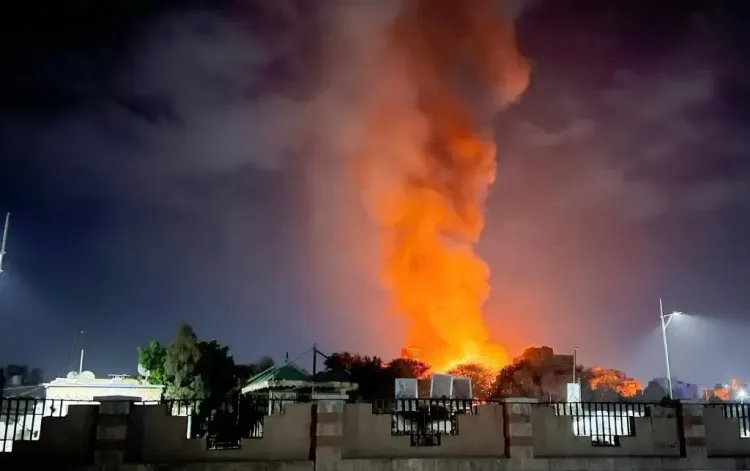US Air Strikes Target Yemen's Fuel Port, Resulting in 80 Fatalities

Synopsis
Key Takeaways
- 80 fatalities confirmed due to air strikes.
- Over 150 individuals injured, including paramedics.
- Ras Isa port is vital for fuel imports.
- Strikes mark the deadliest incident since mid-March.
- The Houthis claim the strikes are a war crime.
Sanaa, April 19 (NationPress) The casualty count from US air strikes on Yemen's fuel port of Ras Isa has escalated to 80, with an additional 150 wounded, according to reports from Houthi-run health officials on Saturday.
The air strikes occurred on Thursday evening, aimed at the port and several concrete tanks designated for storing imported fuel.
Among the victims were port workers, including five paramedics, as reported by Xinhua news agency.
Located northwest of Yemen's Red Sea city of Hodeidah, the port serves as a crucial lifeline for importing fuel into areas under Houthi control.
The Houthi group has maintained control over extensive regions of northern Yemen since initiating a civil war against the government in late 2014.
This attack represents the deadliest incident since the US resumed its strikes on Houthi targets in mid-March.
Five paramedics were also included among the casualties, as stated in earlier reports, indicating that they were killed upon their arrival in ambulances during the second wave of US air strikes that took place shortly after the first.
Reports indicated more than 14 air strikes targeted the fuel port during the two waves, leading to the destruction of concrete tanks and the ignition of massive fires, which were extinguished within hours.
A local resident confirmed to Xinhua that the victims included employees, truck drivers, contracted workers, and civilian trainees of the port, noting that rescue teams engaged in recovering bodies and extinguishing fires were also struck in subsequent air strikes.
Earlier, US Central Command (USCENTCOM) verified in a statement that it struck and destroyed Ras Isa on Thursday to eliminate this fuel source and diminish the Houthis' economic power.
“The Houthis have continued to profit both economically and militarily from foreign support,” USCENTCOM stated on social media platform X. The United States had previously redesignated the Houthi group as a terrorist organization following President Donald Trump's inauguration in January.
USCENTCOM accused the Houthis of using fuel to sustain military operations and benefiting economically from the profits of imports.
In response to the strikes, Yemeni Information Minister Moammar al-Eryani blamed the Houthis for the targeting of the fuel port, accusing the militia of converting the port from a facility serving Yemenis into a hub for smuggling weapons and fuel.
Meanwhile, Minister of Oil and Minerals Saeed al-Shamasi confirmed that government-controlled ports in Aden, Nishtun, Mukalla, and Mocha are prepared to receive fuel and food shipments sufficient to meet market needs across Yemen.
In retaliation, the Houthis condemned the strikes as a war crime, rejecting accusations from the US and the Yemeni government, asserting that the port is a civilian, not military, facility.
In a statement issued on Friday, the Houthis claimed that the US attacks were intended to support Israel in its actions against the Palestinian people, vowing to continue their operations in support of Palestinians. The group also stated that it successfully obstructed all Israeli navigation in the Red Sea.
They assured citizens in northern Yemen that “the oil supply remains stable,” while warning that “the US crime will not go unpunished.”
On Friday, the Israeli military reported intercepting a missile launched from Yemen, believed to have been fired by the Houthis in retaliation for the US air strikes.
In mid-March, Trump directed “decisive and powerful military action” against the Houthis following the group's announcement to resume attacks on Israeli targets, citing Israel's blockade of humanitarian aid to Gaza as justification.










